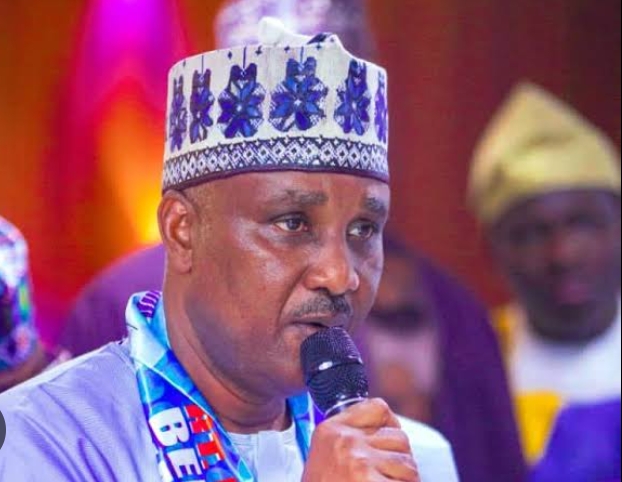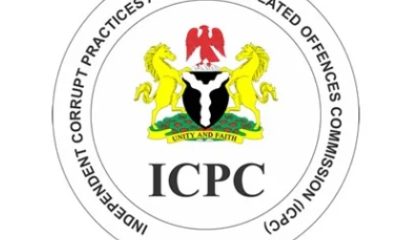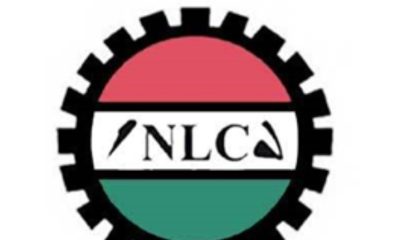Business News
Reps To Investigate Alleged N8.4 Trillion Withheld By NNPCL.

The House of Representatives on Wednesday asked its Committees on Finance, Petroleum (Upstream and Downstream) to investigate reports from the Revenue Mobilisation Allocation and Fiscal Responsibility Commission “alleging that the NNPC (now Nigerian National Petroleum Company Limited) withheld N8.48tn as claimed subsidies for petrol.”
The House further stated that “the investigation will address the NEITI report stating that NNPC (now NNPCL) failed to remit $2bn (N3.6tn) in taxes to the Federal Government.”
The committees were further directed to verify the total cumulative amount of unremitted revenue (under-recovery) from the sale of petrol by the NNPC between 2020 and 2023.
This is as the House approved the 2025-2027 Medium Term Expenditure Framework and Fiscal Strategy Paper ahead of next week’s presentation of the 2025 Appropriation Bill to the National Assembly by President Bola Tinubu.
MTEF is a multi-year plan for public expenditure that sets targets for budget expenditure and fiscal policy. They are designed to ensure these objectives are respected throughout the budget process.
FSP on the other hand, is a document that outlines a country’s fiscal policy and medium-term macro-fiscal framework. It’s a key component of the annual budget process and the Medium-Term Budget Framework.
Recall that President Tinubu on Tuesday, November 19, 2024, transmitted the MTEF/FSP to the National Assembly for consideration, following the approval of the Federal Executive Council.
The Tinubu-led government set the oil benchmark for 2025 at $75 per barrel with oil production projected at 2.06 million barrels per day.
The government also pegged exchange rate parameters at N1,400 per dollar and a projected Gross Domestic Product growth rate of 6.4 per cent per annum.
Dissolving into the Committee of Supply to consider the report of the Committees on Finance and National Planning and Economic Development; presiding officer and Deputy Speaker, Benjamin Kalu had expected the usual ‘carried’ chorus from members when he commenced the clause-by-clause considerations of the 15 recommendations but the Minority Leader of the House, Kingsley Chinda changed the tone of the exercise.
Oil benchmark controversy
Speaking on the $75 oil benchmark controversy, Chinda argued in favour of retaining the 2024 stipulation, arguing that in the first quarter of the year, the country surpassed it.
He said, “Because of the importance and sensitivity of MTEF, I will advise that we consider it thoroughly before we pass. This is one of the most important bills this parliament will ever pass. They recommend a $75, $76.2, and $75.3 benchmark per barrel of crude for 2025, 2026, and 2027 respectively.
“We are aware that for 2024, what we recommended was $77.96, which is the current budget. Today, it is about $85 per barrel. That is, in the first quarter of 2024, we achieved $85 and it increased further. If we are recommending $75 for next year which is one month away against the $77 we recommended for this year, I will advise that we retain the minimum we adopted for this year.
“Rather than increasing, we are reducing, I am not unaware of the issue of moving to gas-propelled vehicles, leaving fossil fuel. I am aware that the world is moving that way and reliance on crude may be a bit reduced but going for $75 might be a bit too low,” he said.
Allaying these fears, the Chairman, House Committee on Finance, Abiodun Faleke, described the $75 per barrel benchmark as “responsible.”
He said, “Crude oil prices at the international market are not controlled by any country. In 2024, we were lucky unfortunately that there were crises in some oil-producing countries and this shot up the prices. In 2025, there is likely to be more stability. If you shoot out too much, it means you are bloating your expectations. Today, the price has crashed to $74. I think our benchmark is reasonable.”
This position was supported by the member representing Ifo/Ewekoro Federal Constituency, Ogun State, Mr Ibrahim Isiaka.
He said, “If we pass this MTEF today and there is a need for amendment, this House can sit and do the necessary review. There was a time when crude sold for $120 per barrel and there was a time it sold for $20. Let us see this as a working document that is subject to review.”
At the end of the debate, the $75 benchmark was adopted and passed.
Oil production
Another contentious clause was the significant increase in domestic crude oil production from 1.78mbdp in 2024 to 2.06, 2.10, and 2.35mbpd for 2025, 2026, and 2027 respectively.
Again, Chinda who represents Obio/Akpor Federal Constituency of Rivers State was on hand to question the rationale for projecting a 2.06mbdp in 2025.
“We are making projections for domestic crude oil production from 1.78mbpd in 2024 to 2.06, 2.10 and 2.35mbdp for 2025, 2026 and 2027. If you look particularly at the social media, they will tell you that we are producing about 2mbp but the truth is, we are not, Although, there is an improvement, but as of yesterday, the volume was 1.05mbpd.
“These are the things that will help us in proper planning so that the government does not have to always come to the National Assembly for borrowing which also exposes us further to criticisms by Nigerians.
“We must be critical about how we set our benchmark. Our target has always been to produce 2mbpd. OPEC quartile for us is 1.8mbpd. Putting this ambitious target of 2.06 and 2.35, we might not really achieve it. If we don’t achieve it, we know we will be tightening our belts. We are already projecting that we will sell 2.06 barrels and if we sell lower than that, we will get lesser funds. Let us reduce our target rate to 2m barrels per day, which has always been our target,” Chinda said.
Justifying the recommendation of the Committee, Faleke stressed that “As of today, the production is close to 2m barrels. It is getting better. Operators of NUPRC gave us the details. If you put a lower projection, you are indirectly telling the operators not to work hard. Let us push them to work harder and get more funding for our country. There was a time during the era of Goodluck Jonathan when we were around 2.5mbpd. Mind you, this 2.06 projection includes all the concentrates. It is not just crude oil alone.”
On the proposed exchange rate of N1,400 to the dollar in the three years under consideration, a lawmaker from Nasarawa State, Gbefwi Gaza said, “In the past few years, we have seen the volatility in our currency. In this country, virtually everything we do is pegged to the dollar. If we don’t have a very good proposed rate, what that means is that we have to increase our borrowing for any deficit.
“What do we have on the ground to make the naira stronger and make the dollar weaker? Yes, we have the Dangote Refinery but we are in a phase of energy transition. We are going to the era of using more batteries and fewer fossil fuels; yet, fossil remains our main source of income.”
The House also adopted inflation rate projections of 15.75, 14.21 and 10.04 per cent for 2025, 2026 and 2017 respectively.
Also in the recommendations, the House agreed that “The 2025 Federal Government of Nigeria budget proposed spending of N47.9tn of which N34.82tn was retained. New borrowings stood at N9.22tn, made up of both domestic and foreign borrowings.”

Capital expenditure is projected at N16.48tn with statutory transfers standing at N4.26tn and sinking funds projected at N430.27bn.

Punch







